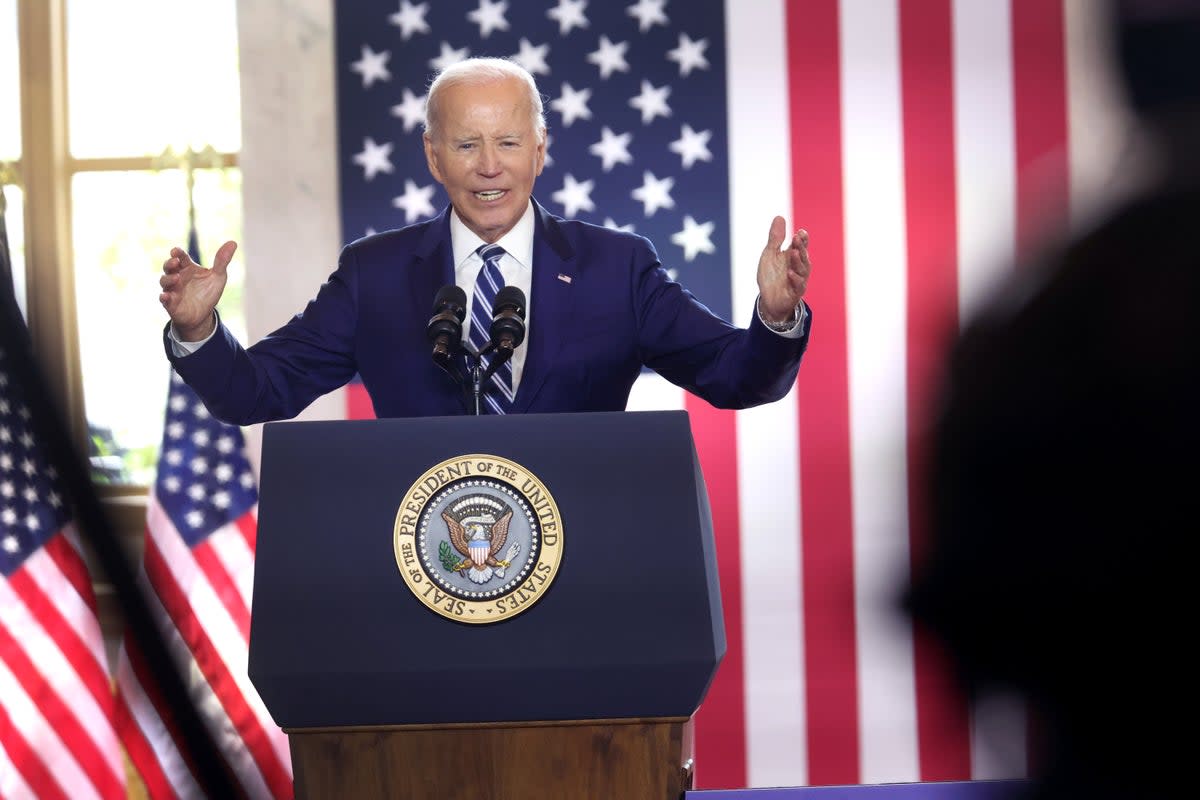Voices: Biden’s economy pitch: Campaign like Reagan while refuting Reagan’s policies

- Oops!Something went wrong.Please try again later.
- Oops!Something went wrong.Please try again later.
The late Lyndon Johnson, the last president who truly was a man of the Senate, reportedly once said giving a speech “is a lot like pissing down your leg. It seems hot to you, but it never does to anyone else.” Nevertheless, voters almost always vote on the economy and, as a result, listening to what politicians plan to do about the economy is ultimately worthwhile.
Ever since President Joe Biden announced his re-election bid, it’s been clear he’s trying to make his 2024 campaign the Democratic mirror image of Ronald Reagan’s 1984 “Morning in America” campaign. Both men faced questions about their advanced age. Mr Biden mixed up Ukraine and Iraq twice yesterday, whereas many have wondered during the 1984 campaign if Mr Reagan began suffering the early stages of the Alzheimer’s that eventually killed him.
They also faced historic inflation – indeed many headlines showing increases in inflation last year noted they were the highest since the 1980s – but by the time Mr Reagan began his historic campaign, the economy had begun to improve. But while Mr Reagan faced the two-headed beast of high unemployment and rising inflation, Mr Biden tried to reassure voters that he is doing all he can to lower prices and that the worst of the pandemic is behind the country.
“Today, inflation is less than half of what it was a year ago,” he said this week. Rising prices remain top of the mind for many voters as the Pew Research Center showed that 65 per cent of voters see it as a “very big problem” even as inflation continues to decline and unemployment remains relatively low.
As a result, Mr Biden attempted to say that he has also taken efforts to lower prices with his Inflation Reduction Act, particularly by allowing Medicare to negotiate drug prices. The same Pew survey found that 64 per cent of voters identified the affordability of healthcare as a “very big problem.
Despite borrowing from the same hymnal as Mr Reagan, Mr Biden is also using the man known as the Great Communicator’s sunny rhetoric to refute the supply-side economics that Mr Reagan espoused, specifically, the idea that tax cuts for the wealthy benefit the middle class.
“I’m tired of waiting for the trickle-down,” Mr Biden said. “It doesn’t come very quickly. Not much trickled down on my dad’s kitchen table growing up.”
Mr Biden is also trying to borrow from Mr Reagan’s playbook by taking an insult and making it a badge of honor. When Mr Reagan ran for president, his belief in deregulation and cutting taxes was derided by George HW Bush as “Voodoo Economics.” Mr Reagan eventually won the argument within the GOP and Mr Bush took up the mantle of Reaganomics, infamously pledging in 1988 that there would be “No New Taxes” (a pledge that spelled the end of his presidency when he raised taxes).
In the same vein, Mr Biden is trying to take the Rupert Murdoch-owned Wall Street Journal’s insult of “Bidenomics” and make it a compliment by touting how well the job market is performing.
“I’m happy to call it ‘Bidenomics,’” he said. “And guess what? Bidenomics is working.”
Of course, whether Bidenomics is actually working is not up for Mr Biden to decide. The voters will ultimately determine if they think they are, to borrow another phrase from The Gipper, better off than they were four years ago come November 2024.
To Democrats, not just Mr Biden, the rub has been that people haven’t associated the policies Mr Biden has implemented with the rebound in the economy. Specifically, he and Democrats have hit Republicans who voted against their legislation while also touting it at home, specifically naming Alabama’s Sen Tommy Tuberville for praising the expansion of rural broadband despite voting against it.
At the same time, Mr Biden tried to return Bidenomics to the central goal he’s made since he took office: that he wants to unify the country.
“And it’s going to help – and I think it’s going to help lessen the division in this country by bringing us back together,” he said. “It makes it awful hard to demagogue something when it’s working, although they do it all the time.”
Mr Biden seemed intent on pointing out how it will benefit red states, which might also show that even if he somehow wins re-election and carries every state he won in 2020 and every Senate seat that is contested that year stays blue, he still risks losing as many as three Senate seats, including in Montana, Ohio and West Virginia, meaning he’d have to work with Republican senators from those states.
Specifically, he focused on how the IRA benefited West Virginia. But that may also have meant to mollify his fellow Democrat, the cantankerous conservative Democratic Sen Joe Manchin, who represents the state and has vigorously criticised Mr Biden’s implementation of the law he wrote. That is a reminder that even if he somehow wins a Senate majority in the White House, Mr Biden will still have to deal with a contentious and slim Democratic caucus.

